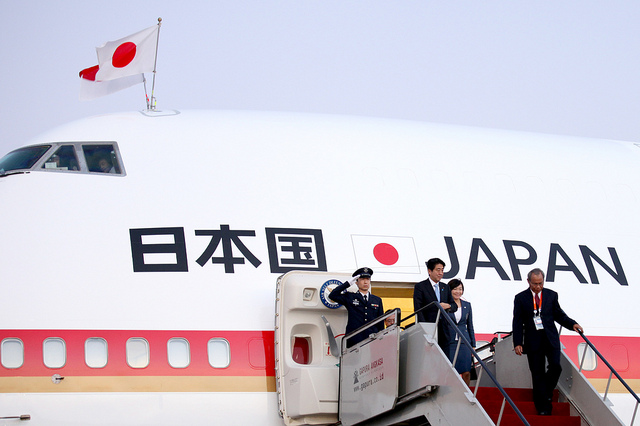Abe’s visit to Australia: Japanese coverage
Posted By Teruhiko Fukushima and Yasuyuki Ishida on July 31, 2014 @ 11:45
It’s been a couple of weeks since Japan’s Prime Minister, Shinzo Abe, delivered an historic address to the Australian Parliament, during a visit that attracted widespread media commentary here. But how was the visit covered by Japanese media?
Just before his departure to the Pacific, Abe’s cabinet had agreed to changes in constitutional interpretation which would allow Japan the right of collective self-defence, though under certain restraints. Prime Ministers Abe and Tony Abbott had already agreed to enter into a ‘special relationship’ at Tokyo in April. So centre-left newspapers that had opposed the changes in constitutional interpretation were waiting for a statement from Mr Abe to stress collective self-defence as one of the pillars of the new Japan–Australia relationship. The Abe address, however, started by expressing condolences for those who had lost their lives during the war, and paid tribute to Australia’s positive approach towards postwar Japan. Then Mr Abe called for working closely with Australia to build an open, ruled-based regional order, based on the two countries’ common US alliances and pledged to raise the banner of a ‘proactive contribution to peace’.
As a result, the centre-left papers seemed to lose their target. With little reference to the parliamentary speech, the Asahi Shimbun, the postwar champion of Japanese pacifism, asserted the moves to strengthen the bilateral and trilateral defence links were part of an ‘anti-China encirclement’. Those links included the agreement concerning the potential transfer of defence equipment and technology and the possible conclusion of a visiting unit status agreement. The paper emphasised the Abbott government’s tough stances against China, in contrast to the ‘China friendly’ approach of former Prime Minister Kevin Rudd. Indeed, the Asahi carried a comment article arguing that Mr Abe’s ‘proactive contribution to peace’ is more accurately seen as military diplomacy—an argument tying together everything from the relaxation of the arms export principles to strengthening of relations with India. The visit to Australia was then set within that context.
The Mainichi Shimbun, another centre-left paper, was more reserved, just reporting that Mr Abbott accepted Mr Abe’s explanation on the new constitutional interpretation on collective self-defence and that the two prime ministers agreed to further consolidate security and defence relations. The paper described the stress on ‘proactive contribution to peace’ in Abe’s address as intended to offset the concerns held by China and Korea over the new emphasis on collective self-defence. Neither centre-left paper said much about the contents of the new security and defence cooperation agreement, nor about the Abe address itself. This may imply the emergence of a new set of domestic circumstances under which those developments would be accepted as natural.
On the other hand, the centre-right papers were more receptive—not only to Abe’s visit but to Abbott’s reception. The Yomiuri Shimbun (circulation about 9.9 million, the largest in Japan) welcomed the initiative for a new ‘special relationship’ as ‘strategic partners sharing the common responsibilities’ for the peace and stability of the Asia-Pacific region. And it responded positively to Abbott’s description of Japan as an ‘exemplary international citizen [2]’. Japan’s leading economic paper, the Nihon Keizai Shimbun, appreciated the signing of the Economic Partnership Agreement (EPA), and Abe’s determination to open Japan’s agricultural market. It stressed Mr Abe’s targeting of TPP, RCEP and FTAAP as the next steps for bilateral collaboration [3]. It carried the remark by the Foreign Minister Julie Bishop that the bilateral EPA had been rated highly by other regional countries as well.
The right-wing Sankei Shimbun was jubilant about the building up of the ‘de facto alliance’, and carried the headline ‘Enthusiastic ovation to Abe performance from the Australian parliament, China grinding their teeth’. The paper emphasised that Mr Abbott’s call to give Japan a ‘fair-go’ must have been a ‘powerful punch for China repeating tenacious criticisms against Japan over history’. While the Sankei may sound a bit over the top, the centre-right papers appreciate both the evolution of Japan–Australia relations and the underlying strategic realities obliging Japan to play more roles.
Despite the fuss about the changes in constitutional interpretation, the Japanese public seems to have begun to recognise the need for Japan to address those ongoing strategic realities. While more than 50% said ‘no’ in opinion polls asking the respondents to answer in a yes-or-no style about the rights for collective self-defence, in other more nuanced polls asking respondents to choose whether they totally support, support with limitations, or oppose, the aggregate ayes reached over 60% [4]. There are some people—not just a few—who understand the need for minimum collective self-defence but who still wish for the changes to be made through referendums. But referendums tend to be blunt instruments. On big policy choices, it takes a huge amount of time to finalise proposals. Australians might remember their own referendum on the republican issue during the 1990s. There are virtues in minimalism, and this time the Abe government had to go with the minimalist approach as well—Japan does not have much time to stand idle. Sometimes we wonder which Japan middle-Australia really wants to see: a Japan that tries hard to work closely with Australia, or a Japan that indulges itself in endless inward-looking deliberations.
Teruhiko Fukushima is professor of the Department of International Relations, National Defense Academy of Japan. Yasuyuki Ishida is research fellow, Japan Institute of International Affairs. Both recently concluded visiting fellowships at ASPI. Image courtesy of Flickr user APEC2013 [5].
Article printed from The Strategist: https://www.aspistrategist.org.au
URL to article: https://www.aspistrategist.org.au/in-reflection-of-pm-abes-visit-to-australia-japanese-coverage/
URLs in this post:
[1] Image: http://www.aspistrategist.org.au/wp-content/uploads/2014/07/10129055763_89b34f5b9e_z.jpg
[2] exemplary international citizen: http://www.pm.gov.au/media/2014-07-08/joint-press-conference-his-excellency-mr-shinzo-abe-prime-minister-japan-parliament
[3] the next steps for bilateral collaboration: http://japan.kantei.go.jp/96_abe/statement/201407/0708article1.html
[4] the aggregate ayes reached over 60%: http://sankei.jp.msn.com/politics/news/140701/stt14070114190007-n1.htm
[5] APEC2013: https://www.flickr.com/photos/apec2013/10129055763
Click here to print.
